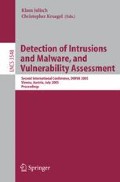Abstract
Recently, a new verification tool for cryptographic protocols called S3A (Spi Calculus Specifications Symbolic Analyzer) has been developed, which is based on exhaustive state space exploration and symbolic data representation, and overcomes most of the limitations of previously available tools.
In this paper we present some insights on the ability of S3A to detect complex type flaw attacks, using a weakened version of the well-known Yahalom authentication protocol as a case study. The nature of the attack found by S3A makes it very difficult to spot by hand, thus showing the usefulness of analyis tools of this kind in real-world protocol analysis.
This work was developed in the framework of the CNR project “Metodi e strumenti per la progettazione di sistemi software-intensive ad elevata complessità”.
Access this chapter
Tax calculation will be finalised at checkout
Purchases are for personal use only
Preview
Unable to display preview. Download preview PDF.
References
Abadi, M., Gordon, A.D.: A bisimulation method for cryptographic protocols. Nordic J. Comput. 5(4), 267–303 (1998)
Abadi, M., Gordon, A.D.: A calculus for cryptographic protocols: The spi calculus. Inf. Comput. 148(1), 1–70 (1999)
Basin, D., Mödersheim, S., Viganò, L.: OFMC: A symbolic model-checker for security protocols. To appear on: International Journal of Information Security (2004)
Boreale, M., De Nicola, R., Pugliese, R.: Proof techniques for cryptographic processes. SIAM J. Comput. 31(3), 947–986 (2002)
Burrows, M., Abadi, M., Needham, R.: A logic of authentication. Proceedings of the Royal Society, Series A 426(1871), 233–271 (1989)
Cibrario Bertolotti, I., Durante, L., Sisto, R., Valenzano, A.: A new knowledge representation strategy for cryptographic protocol analysis. In: Garavel, H., Hatcliff, J. (eds.) TACAS 2003. LNCS, vol. 2619, pp. 284–298. Springer, Heidelberg (2003)
Clarke, E.M., Jha, S., Marrero, W.: Using state space exploration and a natural deduction style message derivation engine to verify security protocols. In: Proceedings of the IFIP Working Conference on Programming Concepts and Methods (PROCOMET 1998), London, pp. 87–106. Chapman & Hall, Boca Raton (1998)
Clarke, E.M., Jha, S., Marrero, W.: Verifying security protocols with Brutus. ACM Trans. Softw. Eng. Meth. 9(4), 443–487 (2000)
De Nicola, R., Hennessy, M.C.B.: Testing equivalence for processes. Theor. Comput. Sci. 34(1-2), 84–133 (1984)
Dolev, D., Yao, A.: On the security of public key protocols. IEEE Trans. Inf. Theory 29(2), 198–208 (1983)
Durante, L., Sisto, R., Valenzano, A.: Automatic testing equivalence verification of spi calculus specifications. ACM Trans. Softw. Eng. Meth. 12(2), 222–284 (2003)
Lamport, L., Paulson, L.C.: Should your specification language be typed? ACM Trans. Program. Lang. Syst. 21(3), 502–526 (1999)
Lowe, G.: Breaking and fixing the Needham-Schroeder public-key protocol using FDR. In: Margaria, T., Steffen, B. (eds.) TACAS 1996. LNCS, vol. 1055, pp. 147–166. Springer, Heidelberg (1996)
Lowe, G.: Casper: a compiler for the analysis of security protocols. In: Proceedings of the 10th IEEE Computer Security Foundations Workshop (CSFW 1997), Washington, pp. 18–30. IEEE Computer Society Press, Los Alamitos (1997)
Millen, J.K., Clark, S.C., Freedman, S.B.: The Interrogator: Protocol security analysis. IEEE Trans. Softw. Eng. 13(2), 274–288 (1987)
Milner, R., Parrow, J., Walker, D.: A calculus of mobile processes, parts I and II. Inf. Comput. 100(1), 1–77 (1992)
Paulson, L.C.: The inductive approach to verifying cryptographic protocols. J. Comput. Sec. 6, 85–128 (1998)
Paulson, L.C.: Relations between secrets: Two formal analyses of the Yahalom protocol. J. Comput. Sec. 9(3), 197–216 (2001)
Schneider, S.: Verifying authentication protocols in CSP. IEEE Trans. Softw. Eng. 24(9), 741–758 (1998)
Syverson, P.: A taxonomy of replay attacks. In: Proceedings of the 7th IEEE Computer Security Foundations Workshop (CSFW 1994), Washington, pp. 187–191. IEEE Computer Society Press, Los Alamitos (1994)
Author information
Authors and Affiliations
Editor information
Editors and Affiliations
Rights and permissions
Copyright information
© 2005 Springer-Verlag Berlin Heidelberg
About this paper
Cite this paper
Cibrario B., I., Durante, L., Sisto, R., Valenzano, A. (2005). Automatic Detection of Attacks on Cryptographic Protocols: A Case Study. In: Julisch, K., Kruegel, C. (eds) Detection of Intrusions and Malware, and Vulnerability Assessment. DIMVA 2005. Lecture Notes in Computer Science, vol 3548. Springer, Berlin, Heidelberg. https://doi.org/10.1007/11506881_5
Download citation
DOI: https://doi.org/10.1007/11506881_5
Publisher Name: Springer, Berlin, Heidelberg
Print ISBN: 978-3-540-26613-6
Online ISBN: 978-3-540-31645-9
eBook Packages: Computer ScienceComputer Science (R0)

